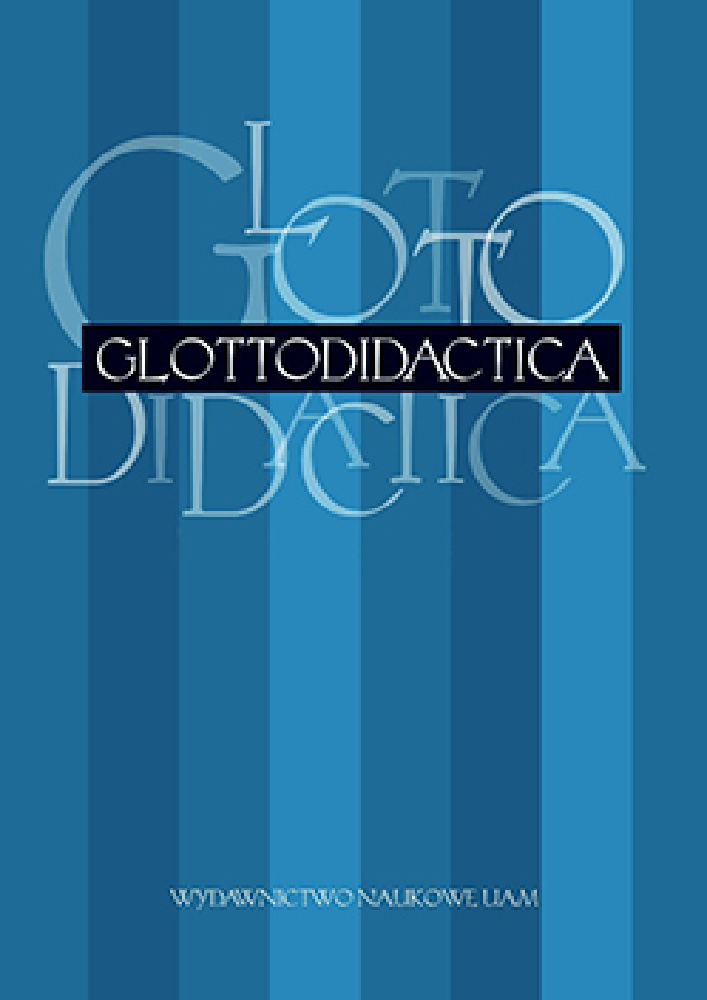Abstract
This article aims to present a didactic teaching proposal, which broaches the issue of evaluation of liaison interpreting. An interpreting scene in the popular series Game of Thrones, in whose third season the slave Missandei serves as a negotiating interpreter, will serve as a live demonstration. On the basis of the evaluation criteria elaborated by Kautz (2002), this scene will be examined and analysed in a plenary session, to enable students to form a clear idea about how negotiation interpreting can look in practice, what difficulties can arise, what solutions can be found and what strategies can be adopted. The subsequent discussion serves as a starting point for further reflections about professional ethics, codes of ethics, the neutrality of the interpreter, etc. This teaching proposal has attracted wide interest and its didactic could all be more than achieved.
References
Behr, M. (2013). Evaluation und Stimmung. Ein neuer Blick auf Qualität im (Simultan-)Dolmetschen. Berlin: Frank & Timme.
Błaszkowska, H. / Stöckmann B. (2011). Bewertung von Dolmetschleistungen im Unterricht. Glottodidactica. An International Journal of Applied Linguistics, 38, 73–82. http://pressto.amu.edu.pl/index.php/gl/article/view/334/241. DOI: https://doi.org/10.14746/gl.2011.38.7
Collados Aís, A. (2016). Evaluación de la calidad y entonación del intérprete de simultánea: pautas evaluadoras. MonTI: Monografías de traducción e interpretación, 3, 213–238.
Collados Aís, Á. / Fernández Sánchez, M. / Gile, D. (2003). La evaluación de la calidad en interpretación: investigación. Granada: Comares.
Collados Aís, Á. / Fernández Sánchez, M. / Stévaux, E. (2001). Concepto, técnicas y modalidades de interpretación. In: A. Collados Aís / M. Fernández Sánchez (Hrsg.), Manual de interpretación bilateral (S. 39‒60). Granada: Comares.
Collados Aís, A. / Pradas Macías, M. E. / Stévaux, E. / García Becerra, O. (2007). La evaluación de la calidad en la interpretación simultánea: Parámetros de incidencia. Granada: Comares.
Collados Aís, A. / Iglesias Fernández, E. / Pradas Macías, M. E. / Stévaux, E. (2011). Qualitätsparameter beim Simultandolmetschen. Interdisziplinäre Perspektiven. Tübingen: Narr. DOI: https://doi.org/10.24053/9783823376378
Gile, D. (2009): Basic concepts and models for interpreter and translator training. Amsterdam, Philadelphia: John Benjamins DOI: https://doi.org/10.1075/btl.8
Kautz, U. (2002). Handbuch der Didaktik des Übersetzens und Dolmetschens. München: Iudicum.
Kutz, W. (1997). Gut für wen? Zur Bewertung von Konsekutivdolmetschleistungen. In: E. Fleischmann / W. Kutz / P. A. Schmitt (Hrsg.), Translationsdidaktik. Grundlagen der Übersetzungswissenschaft (S. 243–254). Tübingen: Narr.
Limbach, C. (2018). Die Bedeutung der interkulturellen Kompetenz für das Gesprächsdolmetschen. In: B. Beníšková (Hrsg.), Interkulturalität in Sprache, Literatur und Bildung. Interculturality in Language, Literature and Education (S. 51–63). Pardubice: Univerzita Pardubice.
Minahan, D. (2013). Game of Thrones – Valar Dohaeris (1. Folge der 3. Staffel). USA.
Pöchhacker, F. (2002). Researching Interpreting Quality. Models and Methods. In: G. Garzone / M. Viezzi (Hrsg.), Interpreting in the 21st Century. Proceedings of the 1st Conference of Interpreting Studies, Forli, University of Bologna (9-11 November 2000) (S. 95–106). Amsterdam, Philadelphia: Benjamins. DOI: https://doi.org/10.1075/btl.43.10poc
Pöchhacker, F. (2004). Introducing Interpreting Studies. New York: Routledge. DOI: https://doi.org/10.4324/9780203504802
Prunč, E. (2011). Differenzierungs- und Leistungsparameter in Konferenz- und Kommunaldolmetschen. In: C. Kainz / E. Prunč / R. Schögler (Hrsg.), Modelling the Field of Community Interpreting. Questions and Methodology in research and training (S. 21‒44). Wien, Berlin: Lit Verlag.
Reinart, S. (2009). Kulturspezifik und Fachübersetzung. Berlin: Frank & Timme.
License
Copyright (c) 2018 Christiane Limbach, Alice Stender

This work is licensed under a Creative Commons Attribution-NoDerivatives 4.0 International License.
Authors
Authors of texts accepted for publication in Glottodidactica are required to complete, sign and return to the Editorial team’s office the Agreement for granting a royalty-free license to works with a commitment to grant a CC sub-license.
Under the agreement, the authors of the texts published in Glottodidactica grant Adam Mickiewicz University in Poznań a non-exclusive, royalty-free license and authorize the use of Attribution-NoDerivatives 4.0 International (CC BY-ND 4.0) Creative Commons sub-license.
The authors retain the right to the free disposal of the work.
Users
Interested Internet users are entitled to use works that have been published in Glottodidactica since 2016, under the following conditions:
▪ attribution – obligation to provide, together with the distributed work, information about the authorship, title, source (link to the original work, DOI) and the license itself.
▪ no derivatives – the work must be preserved in its original form. Without the author's consent, it is not possible to distribute the modified work in the form of translations, publications, etc.
Copyrights are reserved for all texts published before 2016.
Miscellaneous
Adam Mickiewicz University in Poznań retains the property right as a whole (layout, graphic form, title, cover design, logo etc.).
Privacy statement
The names and email addresses published on this journal site will be used exclusively for the purposes declared by this journal and cannot be used for any other purpose or by any other party.





